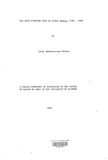| dc.description.abstract | The study presented in this document is about
African-European wars in South Africa in the period 1780-1880.
Active military resistance to European intrusion in this part
of Africa began in 1659, seven years after the establishment
by the Dutch of a half-way station at the Cape of Good Hope.
For one and a quarter century from that date the resistance
was limited to the Khoikhoi and San, who were closer to the
Dutch Cape settlement. By about 1780 the Khoikhoi and San
social cohesion hld, to all intents and purposes, broken down
under the pressure of the expanding Dutch Cape settlement. What
conflict there was between them and Europeans after 1780 ~as for
accomodation rather than for any hopes to expel the latter from
the area. This study is therefore concerned with the resistance
of the Bantu, who, in 1780, were only just coming under the
pressure of the advancing white colonists.
In spite of the spirited resistance that the Bant~
offered during the period covered by this study, by 1881 they had
practically been conquered and subjected to white rule. That the
conquest was a central event in the history of South Africa ca\lnot
be overstated. Neither Mfecane nor the Great.Trek nor the socalled
mineral revolution has had more far-reaching consequences.
The social problems that afflict South Africa today are at
bottom an attempt to readjust, modify or reverse the consequences
and implications ofthat conquest. Yet the event has attracted
little or no scholarly attention. No straight and major study
has been made as to why and how Africans, in spite of the
apparent spiritedness of their resistance, were eventually
conquered and subjected to white rule.
The extant records of this conquest theme were compiled
by non-historians who were by and large concerned to record the
history (heroic exploits)of Europeans in South Africa. The records
are fragmentary and severely biased against Africans., I have
identified these records in the Introduction to this study.
) Professional historians on the other hand have tended to concern
themselves with this conquest theme to the extent only that it
had a direct bearing on their fields of study, which were often
either aspects or general histories of South Africa. The result
is that the African - European conflict has been no more than
brief allusions scattered in passim fashion in their historical
works.
My view is that the conflict is so crucial to the understanding
of South African history that there is an obvious need
to devote a major study to it. There is need to identify the
fundamental issues which lay at its roots; to study its actual
mechanics: the tactical and logistic situations, weaponry deployment
and man-power resources. Such a study, in my opinion, would
go a long way to explain the all important question of why and how
African military resistance to European colonisation of South
Africa collapsed. This study, therefore, is an attempt to provide
such explanation. If the attempt succeds, then, an important gap
in the history of South Africa, I feel, shall have been filled
in. The study would not only be a significant contribution
within the context of South African history but also in the
general and wider continental context of African history.
My thesis i~ this study is that a combination of three
factors explain the collapse of the South African resistance.
The first of these is lack of unity and co-operation within and
among African communities. The result was that the resistance
grJups found it difficult to co-ordinate their resistance efforts •
• The second factor is the impact of Western civilisation on the
African societies. The heavy economic and cultural onslaughts
which that civilisation launched on African societies severely
sapped their strength and made it difficult for them to sustain
drawn-oct war. Finally, the resistance groups had to content
with the problem of disparity in military technology betwe2n
them and the white invading forces. Throughout the resistance
Africans made impressive effort to acquire firearms and, as
will become evident in this study, by the end of the 1870's they
had, at any rate from the point of view of quantity, gone·a long
way to narrow the gap. What they could not, however, master in
a short space of hundred years wa.seffective skill to maintain
and use the firearms. This, as the study clearly shows, remained
their major weakness throughout the resistance and, indeed, may
have been crucial in their final defeat. All these points are
highlighted in the chanters that follow Yet in spite of all these difficulties it can be said
that African resistance to colonial rule in South Africa was
impressive. Africans often won resounding victories and,
although they were finally conquered and subjected to white
rule, they nevertheless effectively prevented Europeans from
repeating what they did in Australia and New Zealand where they
virtually exterminated the Aborigines and Maoris respectively. | en |

